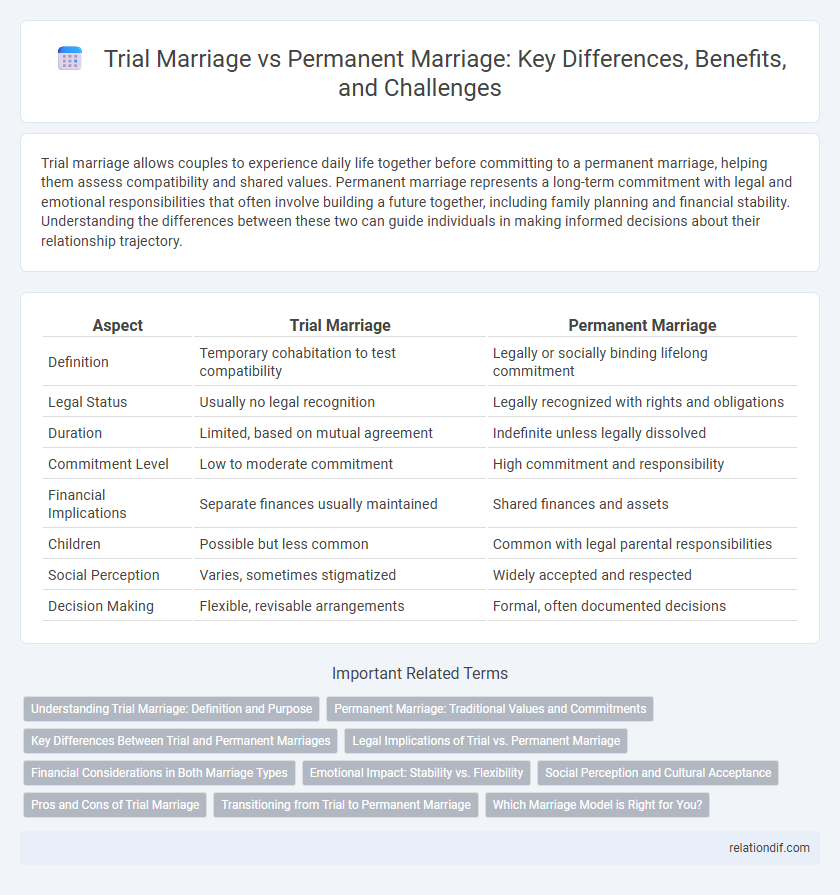Trial marriage allows couples to experience daily life together before committing to a permanent marriage, helping them assess compatibility and shared values. Permanent marriage represents a long-term commitment with legal and emotional responsibilities that often involve building a future together, including family planning and financial stability. Understanding the differences between these two can guide individuals in making informed decisions about their relationship trajectory.
Table of Comparison
| Aspect | Trial Marriage | Permanent Marriage |
|---|---|---|
| Definition | Temporary cohabitation to test compatibility | Legally or socially binding lifelong commitment |
| Legal Status | Usually no legal recognition | Legally recognized with rights and obligations |
| Duration | Limited, based on mutual agreement | Indefinite unless legally dissolved |
| Commitment Level | Low to moderate commitment | High commitment and responsibility |
| Financial Implications | Separate finances usually maintained | Shared finances and assets |
| Children | Possible but less common | Common with legal parental responsibilities |
| Social Perception | Varies, sometimes stigmatized | Widely accepted and respected |
| Decision Making | Flexible, revisable arrangements | Formal, often documented decisions |
Understanding Trial Marriage: Definition and Purpose
Trial marriage is a temporary cohabitation arrangement where couples live together to evaluate compatibility before committing to permanent marriage. This period allows partners to assess shared values, communication styles, and lifestyle habits in a real-life context. The purpose of trial marriage is to reduce the risk of future marital conflicts by ensuring mutual understanding and alignment of expectations.
Permanent Marriage: Traditional Values and Commitments
Permanent marriage embodies deeply rooted traditional values emphasizing lifelong commitment, mutual respect, and stability within the relationship. It fosters a legal and social framework that supports familial growth, inheritance rights, and shared responsibilities, providing a foundation for raising children and building generational bonds. Upholding vows in a permanent marriage often reinforces trust and emotional security, essential elements for enduring partnerships.
Key Differences Between Trial and Permanent Marriages
Trial marriage allows couples to experience cohabitation and test compatibility without legal commitment, often lacking formal recognition and rights. Permanent marriage establishes a legally binding union with defined rights, responsibilities, and societal recognition, offering stability and legal protections. The key differences lie in the level of commitment, legal status, and the emotional and financial security provided by permanent marriage compared to the flexibility and temporary nature of trial marriage.
Legal Implications of Trial vs. Permanent Marriage
Trial marriage lacks formal legal recognition, leaving partners without the rights and protections established by permanent marriage, such as inheritance, spousal support, and tax benefits. Permanent marriage provides legally binding contracts that safeguard property division, child custody, and decision-making authority during separation or death. Understanding these legal implications is crucial for couples considering trial marriage to avoid unforeseen vulnerabilities.
Financial Considerations in Both Marriage Types
Trial marriage offers a flexible approach to financial responsibilities, often involving separate accounts and limited shared assets, reducing economic risks during the evaluation period. Permanent marriage typically requires joint financial planning, combining incomes, liabilities, and assets, which can lead to more complex tax benefits and obligations. Understanding the financial implications in both marriage types helps couples make informed decisions about resource management and long-term economic stability.
Emotional Impact: Stability vs. Flexibility
Trial marriage offers emotional flexibility by allowing couples to explore compatibility without full commitment, reducing immediate pressure and potential heartbreak. Permanent marriage provides emotional stability through a formalized bond, fostering a sense of security and long-term support. Emotional impact varies as trial marriage adapts to personal growth, while permanent marriage emphasizes enduring partnership and shared responsibilities.
Social Perception and Cultural Acceptance
Trial marriage often faces skepticism within traditional societies where permanent marriage is viewed as a lifelong commitment rooted in cultural and religious values. Social perception tends to favor permanent marriage as a symbol of stability and familial honor, while trial marriage may be seen as experimental or lacking seriousness. Cultural acceptance of trial marriage varies widely, with increasing openness in urban and progressive communities contrasted by conservative resistance in rural or orthodox settings.
Pros and Cons of Trial Marriage
Trial marriage offers couples a practical way to evaluate compatibility, emotional connection, and lifestyle alignment before committing legally, reducing the risk of costly divorces. However, the lack of formal commitment can lead to uncertainty, social stigma, and potential legal challenges regarding property and children. Choosing a trial marriage requires careful consideration of cultural norms, personal values, and long-term relationship goals.
Transitioning from Trial to Permanent Marriage
Transitioning from trial marriage to permanent marriage requires clear communication of expectations, mutual commitment, and alignment of long-term goals. Couples should evaluate compatibility in daily habits, conflict resolution, and emotional support before formalizing their union. Establishing legal and financial agreements during this transition ensures stability and shared responsibility in the permanent marriage.
Which Marriage Model is Right for You?
Choosing between trial marriage and permanent marriage depends on personal values and relationship goals, as trial marriages offer a period to evaluate compatibility while permanent marriages commit partners legally and emotionally from the start. Trial marriages provide flexibility and reduce the risk of divorce, appealing to individuals prioritizing exploration and mutual understanding before full commitment. In contrast, permanent marriages emphasize stability, long-term planning, and societal recognition, making them suitable for couples ready to formalize their union unequivocally.
trial marriage vs permanent marriage Infographic

 relationdif.com
relationdif.com